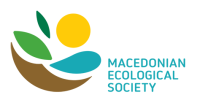Enumeration and antimicrobial activity of bacterial isolates from undisturbed and contaminated soils in North Macedonia
DOI:
https://doi.org/10.59194/MJEE24262129kKeywords:
soil microbiology, antimicrobial activity, Bacillus, ActinobacteriaAbstract
Particularly in temperate regions, seasonal change has an effect on microbial communities directly through climatic function. The microbial populations of an undisturbed and contaminated soil undergo temporal change over the course of four seasons. Eight soil samples were collected from different regions in North Macedonia. The undisturbed soil was collected from mountain Karadzica (protected area Jasen) and the contaminated soil was collected around the factory OHIS, operating in the chemical industry. The samples were collected using sterile bags along with sterile spatula. All the samples were transffered to the Microbiology laboratory, under sterile conditions. Bacillus spp. and Actinobacteria were isolated from the samples using a dillution method, based on the use of heat pretreatment for the isolation of Bacillus spp. and a selective media for the isolation of Actinobacteria. Confirmation was carried out by Gram staining method of all isolates. Soil samples corresponding to the autumnal season showed the greatest number of antimicrobial strains, 30 in total from both regions. Soil pH and moisture contents and as well as the concentration of organic carbon were determined for all soil samples. We found an inverse correlation between the organic carbon content and the number of isolates from undisturbed soil and a positive correlation between the both parameters in contaminated soil. Antimicrobial assays of the isolates were carried out against six bacteria and three fungi, using the agar well diffusion method. Bacillus strains from the undisturbed soil samples showed greater antimicrobial activity against Gram negative test microorganisms from the winter samples, while Bacillus strains from the summer contaminated soil samples demonstrated larger activity. In comparison, Actinobacteria strains demonstrated antagonistic activities only from the autumn season from both samples. The findings of this study show that the relationship between of the microbial communities and their ecosystem depend on the presence of anthropogenic contamination.
Downloads
Published
How to Cite
Issue
Section
License
Copyright (c) 2024 Sofija Kostandinovska, Nikola Radmanovik, Ognen Boskovski, Dzoko Kungulovski, Natalija Atanasova-Pancevska

This work is licensed under a Creative Commons Attribution 4.0 International License.
Macedonian Journal of Ecology and Environment applies the Creative Commons Attribution 4.0 International ![]() license to articles and supplementary material we publish. If you submit your paper for publication to Macedonian Journal of Ecology and Environment, you agree to have the CC BY license applied to your work. Under this Open Access license, you as the author agree that anyone can reuse your article in whole or part for any purpose, for free, even for commercial purposes. Anyone may copy and redistribute the material in any medium or format as long as the author and original source are properly cited. This facilitates freedom in re-use and also ensures that Macedonian Journal of Ecology and Environment content can be mined without barriers for the needs of research.
license to articles and supplementary material we publish. If you submit your paper for publication to Macedonian Journal of Ecology and Environment, you agree to have the CC BY license applied to your work. Under this Open Access license, you as the author agree that anyone can reuse your article in whole or part for any purpose, for free, even for commercial purposes. Anyone may copy and redistribute the material in any medium or format as long as the author and original source are properly cited. This facilitates freedom in re-use and also ensures that Macedonian Journal of Ecology and Environment content can be mined without barriers for the needs of research.
Author - the holder of copyrights is encouraged to sign and return the Copyright form prior to the publication of the scientific article.
Licencing:

Macedonian Journal of Ecology and Environment is licensed under a Creative Commons Attribution 4.0 International License.

